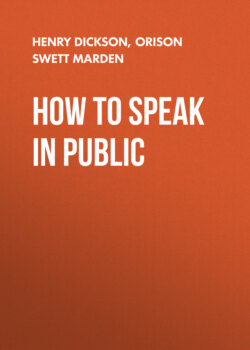Читать книгу HOW TO SPEAK IN PUBLIC - Henry Dickson - Страница 12
На сайте Литреса книга снята с продажи.
CHAPTER VII.
How to be Heard When Speaking in Public
ОглавлениеTable of Contents
As you rise to speak, cast your eyes easily over the audience for a few seconds, then fix them upon the farthest auditors directly in front of you, and begin to speak in a pleasant tone of voice and with an easy naturalness of manner.
2. Regulate the “pitch” and “force” of voice by actually talking to your farthest auditors. The introductory matter should be delivered as if conversing with people at that distance. At the opening of your address you do not need to attempt anything more than to make the most distant listeners hear you distinctly, and without effort on their part. In order to do this—
3. Enunciate deliberately: that is, take sufficient time to utter every syllable that a correct standard of pronunciation demands should be enunciated. Be especially careful to “take time” during the delivery of the first half-dozen sentences. The characteristic of good speaking in the introductory matter is deliberateness. Much of your success will depend upon starting right.
4. As your earnestness of manner increases, still be careful to enunciate firmly and with the necessary deliberation to secure perfect syllabication. Keep the rights of the farthest auditors in mind throughout the address. If they hear you, all will hear. Be especially mindful of the distinct utterance of the closing words of sentences. Speakers often lower the pitch, diminish the force, and enunciate so rapidly as to become indistinct and nearly inaudible. Secure proportion and cadence in the vocal treatment of the close of a sentence, but without sacrificing distinctness.
5. Do not be troubled about the quality of tone further than to speak in a pleasing manner.
6. As to style: be natural; be yourself at your best; that is, talk to the people in your own way, only with the increased earnestness that arises from your deep interest in the subject, and your desire to benefit your audience; and with the effect which comes from the reflex influence of the sympathetic attention of the audience upon your feelings. The perfection of public speaking is the perfection of talking to people earnestly. It is the tone and manner of good conversation raised to its highest power. An earnest colloquial style will be easily heard, and you will not degenerate into screaming with its consequent unpleasantness and fatigue of voice.
7. Avoid hurry in speaking. In your most animated passages do not speak so rapidly as to injure good syllabication, or mar the clear and melodious communication of ideas.
8. Rest all you can before speaking. Compose the nerves. If you speak in the evening, avoid getting physically tired during the day. Take a good nap in the afternoon. Take a cup of hot weak tea just before speaking, if it is possible to do so. This is desirable, though not essential.
9. Banish mental anxiety so far as you can. Do not fear that you will not be heard. Prepare yourself thoroughly and you will not fail. Be self-possessed. Self-possession depends chiefly upon thorough preparation and a proper amount of rest. If you cannot be self-possessed, be as self-possessed as you can.
Prof. J. W, Churchill
